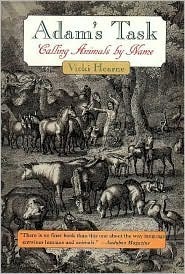What do you think?
Rate this book


274 pages, Paperback
First published January 1, 1986
I believe that the disciplines (of animal training) come to us in the form they do because deep in human beings is the impulse to perform Adam's task, to name animals and people as well, and to name them in such a way that the grammar is flexible enough to do two things. One is to make names that give the soul room for expansion. My talk of the change from utterances such as “Belle, Sit!” to “Belle, Go find!” is an example of names projecting the creature named into more glorious contexts...But I think our impulse is also conservative, an impulse to return to Adam's divine condition. I can't imagine how we would do that, or what it would be like, but linguistic anthropology has found out some things about illiterate peoples that suggest at least names that really call, language that is genuinely invocative and uncontaminated by writing and thus by the concept of names as labels rather than genuine invocations.
If one goes about all day expounding the principles of animal training, one gets no training done. Besides, there aren't any principles of animal training, only some aphorisms, dog stories and what not, just as there don't seem to be, if one looks closely, any principles of philosophy, just some insightful epigrams and philosopher stories.
Some dogs make continuous declarations of love – or seem to – and this can enable some people to survive psychic wildernesses of one sort and another, but it is only training, work, that creates a shared grammar of objects of contemplation outside of the dog and the master, and there's where the best conversations start and with them the bonds of that deeper love that consists in thinking.
Horses do have some sensitivity to the knowledge of death, and it makes them nervous, just as it makes us nervous. That knowledge is what they are relieved of, just as their riders are, in the tremendous concentration of horsemanship at the highest levels...Nothing short of the tremendous artistic task of training them in such a fashion as they can be released from time could ever justify our interfering with their greater serenity, our imposing our stories and our deathly arithmetics on their coherent landscapes. What they mean by their artistry, then, is just this, which one could call the release from time, but which could also be understood as what happens when a horse becomes time's lover or time's partner, moving with time instead of as time's slave.
It is possible for me to contemplate the possibility that allowing the right Pit Bulls, in the hands of the right people, to fight can be called kind because it answers to some energy essential to the creature, and I think of energy, when I think of certain horses, as the need for heroism.
The alternative to the kind of training Lovaas does is a life in a hospital, continuously drugged and restrained – a life that does not seem to make autistic people unhappy. They are quite content. Why interfere with their contentment? Wittgenstein, who once said, “We like the world because we do,” might here say we do this because we do it. Interfere we must.
I am ending my book by appealing to the sense I have developed, as a result of reading and thinking like a dog and horse trainer for several decades now, that animals matter to us, and that the way they matter to us is probably all we can know of how and why we matter.